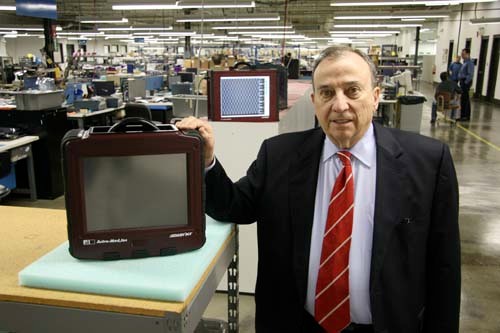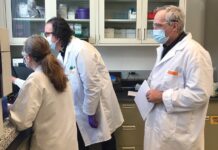
For developing a portable data-acquisition system, the Dash MX, Astro-Med Inc. in West Warwick won the national NASA Tech Briefs product of the month competition for October and is now in the running to capture the product-of-the-year award from the technology magazine.
Everett V. Pizzuti, president and CEO of Astro-Med, said his company already is receiving orders for the Dash MX, even though the product was only introduced to the market in early November.
“We’ll be making our first deliveries in December,” he told Providence Business News.
The Dash MX is a high-speed, multi-channel system engineered for capturing high-frequency data and transient signals, according to a release from the company.
A key to the product’s expected success is its small size. “We packed a lot of technology into one small, rugged package,” Pizzuti said, including an internal rechargeable battery for backup and up to 30 minutes of operation.
While he declined to specify how much Astro-Med spent to develop the device, a process that took more than a year, Pizzuti said most products Astro-Med recently introduced cost in the range of $500,000 to $1 million each to develop. Most of Astro-Med’s products are manufactured in West Warwick or at an Astro-Med plant in Rockdale, Mass.
The Dash MX is designed for applications ranging from manufacturing-process monitoring to remote troubleshooting, the company said. The device can be used in the automotive field, as well as aerospace, electric utility, telecommunications, pulp and paper, metals manufacturing, steel mills, research and development labs, as well as the medical, scientific and educational markets.
In the automotive industry, he said, the device can track the capability of newly manufactured vehicles in such areas as emission and engine performance. Astro-Med already does business with major carmakers around the world and they are among the most likely customers for the new Dash MX, Pizzuti said.
Astro-Med previously has won other NASA Tech Briefs product awards and Pizzuti is hopeful that the local company will snare the annual award for the Dash MX, an honor that will be decided by the magazine’s readers. “Hopefully, we’ll be able to get back to you with good news after the first of the year,” he said.
(NASA Tech Briefs, with a circulation of 190,000, is a monthly magazine that features innovations developed by the National Aeronautics & Space Administration and its industry partners such as Astro-Med.)
Technological developments occur so quickly that Pizzuti said he expects Astro-Med will sell the Dash MX only for the next three or four years before it becomes obsolete and ready for replacement with a newer version.
“We’re already designing its replacement,” he said. “We need to [prepare] for our own products to become obsolete before our competitors do.”
With 40 engineers on staff and a work force of 250 employees in Rhode Island, Astro-Med introduces “four or five” new products every year, Pizzuti said. “We compete with companies around the world,” he added, noting that the most intense competition comes from Asian companies. •










